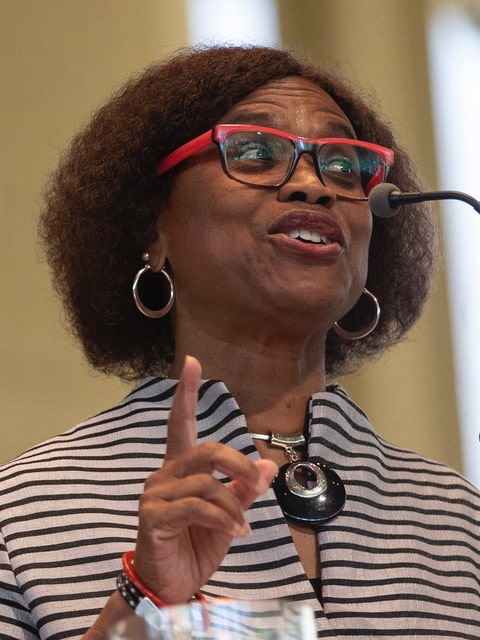[The passing of former Pope Benedict XVI] marks what is, I hope, the end of a long, painful era for LGBTQIA+ Catholics, our families, and the entire church. (DignityUSA Executive Director Marianne Duddy-Burke)
Pope Benedict XVI, who served as pope from 2005 until his historic retirement in 2013, was laid to rest today. What else from his complicated legacy will be laid to rest? Many Catholics, particularly LGBTQ+ ones, will forever recall the legacy of his unusual papacy with mixed feelings, and rightly so.
First and foremost in the remembrance of Benedict will be his mishandling of the Catholic Church sex scandal cover-up. As the archbishop in Munich, then-Cardinal Joseph Ratzinger (who served from 1977 until his accession to the papacy) sent out a letter on May 18, 2001, ordering all his bishops, under the threat of ecclesiastical punishment, to observe “papal secrecy” to keep sex abuse allegations concealed from both the public and the police. Benedict moved pedophilic priests from parish to parish like pieces on a chess board. The Vatican defended Benedict’s actions, stating critics are looking for “easy scapegoats and summary judgments.”
Boston Archbishop Sean O’Malley called Benedict a man who “was very concerned with relativism and the truth being compromised.” But as a church traditionalist, Benedict’s “truth” ruled with an iron fist who used his authoritarian and “Rottweiler” persona to maintain the ecclesiastical structures of the ancient Catholic church.
Sadly, Benedict’s anti-modernity views on AIDS and women’s roles within the Catholic Church hierarchy were both retro, reckless and spiritually abusive. For example, he stuck by his no-condoms stand even in the age of AIDS.
Benedict publicly bashed a group of U.S. “dissident” nuns for “focusing its work too much on poverty and economic injustice, while keeping ‘silent’ on abortion and same-sex marriage.” Benedict accused these sisters of promoting “certain radical feminist themes incompatible with the Catholic faith.”
But it was his venomous public condemnation of LGBTQ+ people that was unrelenting.
“It is impossible to overstate the damage Pope Benedict’s repeated dehumanizing of LGBTQIA+ people have caused,” DignityUSA Executive Director Marianne Duddy-Burke said in a statement. “Individuals, families, and whole communities across the globe suffered tragic consequences, many of which are still felt today.”
(DignityUSA is the world’s oldest organization of Catholics working for justice, equality and full inclusion of LGBTQIA+ people in the church and society.)
Benedict even injected his voice in the presidential election of 2004. He instructed American bishops to read his declaration that any “catholic politician” (e.g., John Kerry, Joe Biden, Nancy Pelosi) who did not denounce gays and abortion could not receive communion.
He famously denounced same-sex marriage in a Christmas sermon, saying it would destroy the “essence of the human creature.” In previous anti-LGBTQ+ sermon diatribes during his tenure, Benedict called marriage equality a “manipulation of nature” and a threat to world peace.
Benedict stated in a 1986 “Letter to the Bishops of the Catholic Church on Pastoral Care of Homosexual Persons”: “Although the particular inclination of the homosexual person is not a sin, it is more or less a strong tendency ordered toward an intrinsic moral evil.”
While the Vatican’s Congregation for the Doctrine of Faith was under his direction, he wrote on its website:
Those who would move from tolerance to the legitimization of specific rights for cohabiting homosexual persons need to be reminded that the approval or legalization of evil is something far different from the toleration of evil.
The problem with Benedict’s calling us evil is that it not only diminished the human life of LGBTQ+ people, but it also denied the suffering that causes.
Benedict suppressed the growth of liberation theologies — which combine Christian theology with political activism on human rights and social justice issues — in the developing world, the emerging face of the Catholic Church, for their supposedly Marxist leanings that exposed classism. Liberation theologies emphasize the biblical themes that God’s actions on behalf of the enslaved, the poor and outcasts such as women, people of color, and LGBTQ+ people to name a few, are a central paradigm for a faith that embraces the world as it is today from an engaged and committed stance that does justice.
Benedict had asked for forgiveness and apologized for his complicity in the church sex scandal. Perhaps dedicating his final years to prayer was his act of penance.
And what will be his legacy?
While we note that his track record with the LGBTQ community is not positive, his inspired decision to resign the Papacy was instrumental for the more inclusive papacy of his successor Pope Francis with his unequivocal commitment to open up the Church to the people of the periphery. (Chris Vella, co-chair, Global Network of Rainbow Catholics)

Public theologian, syndicated columnist and radio host Rev. Irene Monroe is a founder and member emeritus of several national LBGTQ+ black and religious organizations and served as the National Religious Coordinator of the African American Roundtable at the Center for LGBTQ and Religion Studies in Religion at Pacific School of Religion. A graduate of Wellesley College and Union Theological Seminary, she served as a pastor in New Jersey before studying for her doctorate as a Ford Fellow at Harvard Divinity School and serving as the head teaching fellow of the Rev. Peter Gomes at Memorial Church. She has taught at Harvard, Andover Newton Theological Seminary, Episcopal Divinity School and the University of New Hampshire. Her papers are at the Schlesinger Library at Radcliffe College’s Research Library on the History of Women in America.
